-
 bitcoin
bitcoin $109667.069529 USD
-3.03% -
 ethereum
ethereum $3936.685804 USD
-4.07% -
 tether
tether $1.000493 USD
0.01% -
 xrp
xrp $2.771823 USD
-4.74% -
 bnb
bnb $957.805027 USD
-5.34% -
 solana
solana $196.735100 USD
-6.68% -
 usd-coin
usd-coin $0.999727 USD
-0.01% -
 dogecoin
dogecoin $0.227355 USD
-5.12% -
 tron
tron $0.335205 USD
-0.81% -
 cardano
cardano $0.779256 USD
-3.59% -
 ethena-usde
ethena-usde $0.999900 USD
-0.06% -
 hyperliquid
hyperliquid $42.492095 USD
-6.61% -
 chainlink
chainlink $20.501853 USD
-4.34% -
 avalanche
avalanche $28.952606 USD
-11.21% -
 stellar
stellar $0.356038 USD
-3.93%
Is a Bitcoin ETF suitable for long-term investment?
A Bitcoin ETF offers stock-like access to crypto exposure without direct ownership, blending regulatory oversight with market risks and fees that may impact long-term returns.
Sep 25, 2025 at 09:00 pm

Understanding Bitcoin ETFs in the Investment Landscape
1. A Bitcoin Exchange-Traded Fund (ETF) allows investors to gain exposure to Bitcoin’s price movements without directly owning the cryptocurrency. This financial product is traded on traditional stock exchanges, making it accessible to a broader range of investors who may be hesitant to navigate crypto exchanges.
2. Unlike holding actual Bitcoin, which requires managing private keys and using digital wallets, a Bitcoin ETF simplifies the process by bundling assets into a regulated security. This structure appeals to institutional investors and those seeking compliance with existing financial regulations.
3. The underlying mechanism of a Bitcoin ETF typically involves holding either physical Bitcoin or futures contracts. Physically backed ETFs store actual BTC in secure custody solutions, while futures-based ETFs derive value from derivatives markets, introducing different risk profiles.
4. Regulatory approval plays a crucial role in the legitimacy and stability of Bitcoin ETFs. Jurisdictions like the United States have shown increasing acceptance, with several spot Bitcoin ETFs receiving SEC clearance after years of scrutiny, signaling growing integration into mainstream finance.
5. Because these funds are subject to daily trading activity, their market price can deviate from the net asset value (NAV), creating premiums or discounts. Investors must monitor such discrepancies when evaluating performance over time.
Risks Associated with Long-Term Holdings in Bitcoin ETFs
1. Expense ratios for Bitcoin ETFs can be significantly higher than those of traditional index funds. These recurring fees accumulate over time and may erode long-term returns, especially if Bitcoin’s price growth stagnates.
2. Tax implications differ between direct crypto ownership and ETF investments. In some regions, ETFs are treated as securities, leading to capital gains taxes upon sale, whereas direct holdings might qualify for different tax treatments depending on jurisdiction.
3. Custodial risk remains a concern even though third-party custodians manage the underlying Bitcoin. If the custodian experiences a breach or operational failure, investor assets could be compromised despite insurance measures.
4. Market manipulation and volatility in the broader cryptocurrency space can indirectly affect ETF pricing. Sudden regulatory shifts or macroeconomic events may trigger sharp swings, impacting long-term portfolio stability.
5. Liquidity constraints may arise during periods of extreme market stress. While ETFs trade on public exchanges, redemption mechanisms might lag behind real-time demand, affecting exit strategies for long-term holders.
Performance Comparison: ETF vs. Direct Ownership
1. Historically, investors who held Bitcoin directly have benefited from full exposure to price appreciation, including participation in network upgrades and airdrops—benefits not extended to ETF shareholders.
2. Tracking error is a known issue with some Bitcoin ETFs, particularly those based on futures contracts. Contango in the futures market can lead to negative roll yields, causing the ETF to underperform the spot price over extended periods.
3. Dividend-like benefits such as staking rewards or yield generation are unavailable in standard Bitcoin ETFs. Direct holders can leverage DeFi platforms or lending services to earn passive income, enhancing total return potential.
4. Transparency levels vary between products. Some ETF providers disclose holdings daily, while others do so less frequently, limiting an investor’s ability to verify alignment with stated objectives.
5. Access to audit trails and proof-of-reserves differs significantly. Direct owners can independently verify wallet balances on the blockchain, whereas ETF investors rely solely on fund disclosures and auditor reports.
Frequently Asked Questions
What determines the price of a Bitcoin ETF?The price is influenced by supply and demand dynamics on the stock exchange, the net asset value of the underlying Bitcoin holdings, management fees, and overall market sentiment toward both cryptocurrencies and financial securities.
Can a Bitcoin ETF lose all its value?Yes, although unlikely under normal conditions, a complete loss could occur due to custodial failure, regulatory shutdown, prolonged market decline, or structural flaws in the fund’s operation that prevent accurate tracking of Bitcoin’s price.
Do Bitcoin ETFs provide voting rights or governance privileges?No, investors in Bitcoin ETFs do not hold actual cryptocurrency and therefore cannot participate in protocol-level decisions or community governance initiatives associated with blockchain networks.
Are there differences in how global markets regulate Bitcoin ETFs?Absolutely. Countries like Canada and parts of Europe approved Bitcoin ETFs earlier than the U.S. Regulatory frameworks vary widely, affecting eligibility criteria, disclosure requirements, and permissible investment structures across borders.
Disclaimer:info@kdj.com
The information provided is not trading advice. kdj.com does not assume any responsibility for any investments made based on the information provided in this article. Cryptocurrencies are highly volatile and it is highly recommended that you invest with caution after thorough research!
If you believe that the content used on this website infringes your copyright, please contact us immediately (info@kdj.com) and we will delete it promptly.
- AlphaTON's Bold Bet: Toncoin, Balance Sheets, and the Future of Digital Treasuries
- 2025-09-27 04:45:15
- Crypto Kidnapping in Minnesota: A New York Minute Breakdown of the $8 Million Heist
- 2025-09-27 04:25:14
- Avalanche, RUVI, and the Altcoin Rush: What's Fueling the Fire?
- 2025-09-27 04:25:14
- Optimism's Breakdown: Navigating Support Zones for the Next Move
- 2025-09-27 04:45:15
- Linea Price Surges as SWIFT Pilots Blockchain Messaging: A New Era for Global Payments?
- 2025-09-27 04:50:01
- Dogecoin Price Prediction & Crypto Buy: Navigating the Meme Coin Maze
- 2025-09-27 04:50:01
Related knowledge
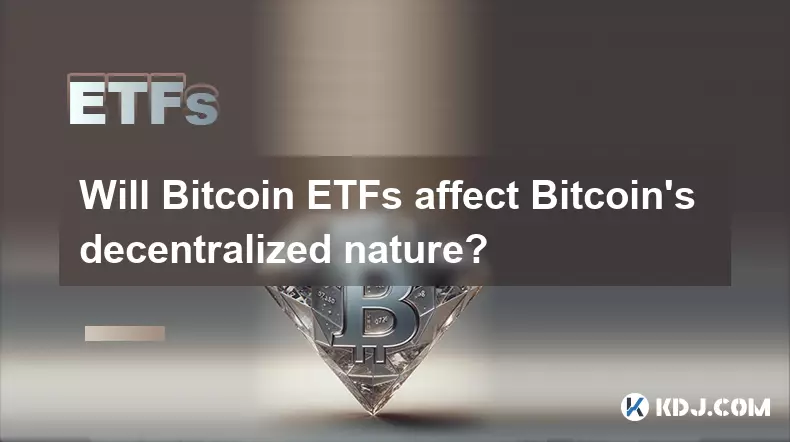
Will Bitcoin ETFs affect Bitcoin's decentralized nature?
Sep 24,2025 at 02:00am
Impact of Bitcoin ETFs on Market Accessibility1. Bitcoin ETFs have significantly lowered the barrier to entry for traditional investors who may not be...
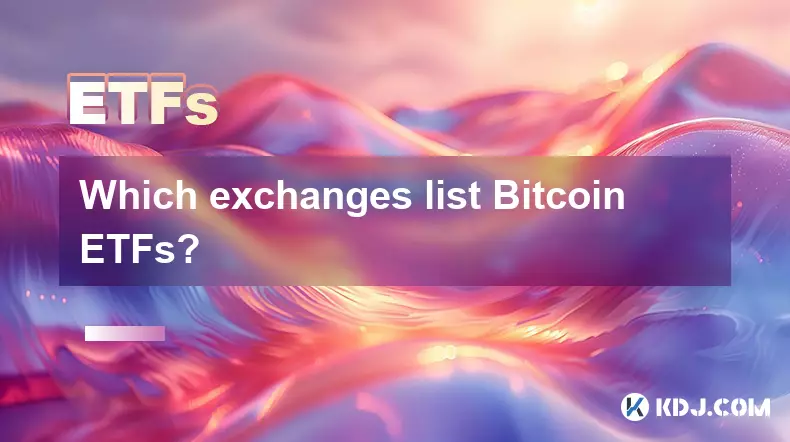
Which exchanges list Bitcoin ETFs?
Sep 26,2025 at 03:18am
Major Cryptocurrency Exchanges Offering Bitcoin ETFs1. The landscape of digital asset trading has evolved significantly with the introduction of Bitco...
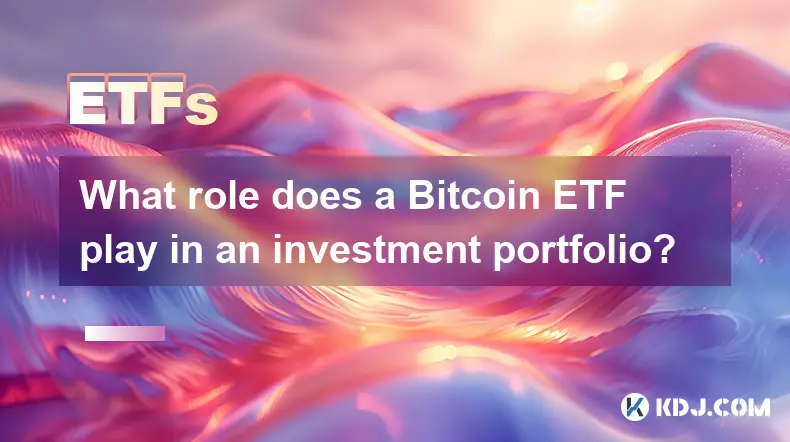
What role does a Bitcoin ETF play in an investment portfolio?
Sep 27,2025 at 12:36am
Understanding the Function of a Bitcoin ETF in Portfolio Diversification1. A Bitcoin ETF allows traditional investors to gain exposure to cryptocurren...

Is the volatility of Bitcoin ETFs consistent with Bitcoin?
Sep 26,2025 at 01:18am
Bitcoin ETFs and Their Relationship to Bitcoin Price Movements1. Bitcoin ETFs are financial instruments designed to mirror the price of Bitcoin withou...
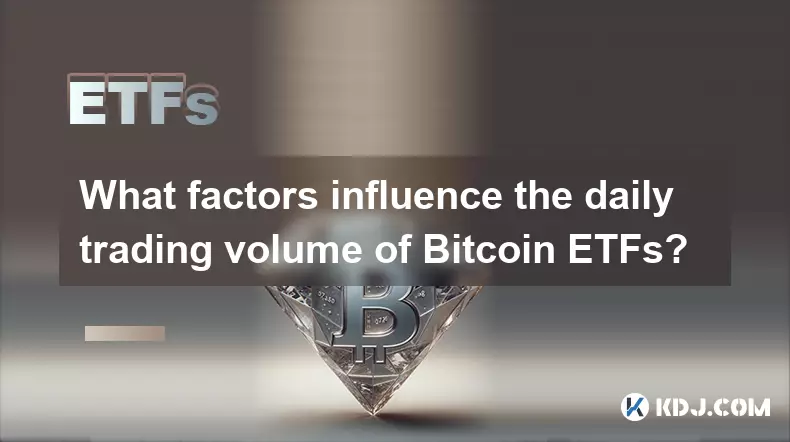
What factors influence the daily trading volume of Bitcoin ETFs?
Sep 23,2025 at 07:18am
Market Sentiment and Investor Confidence1. The perception of economic stability heavily affects how investors approach Bitcoin ETFs. When macroeconomi...
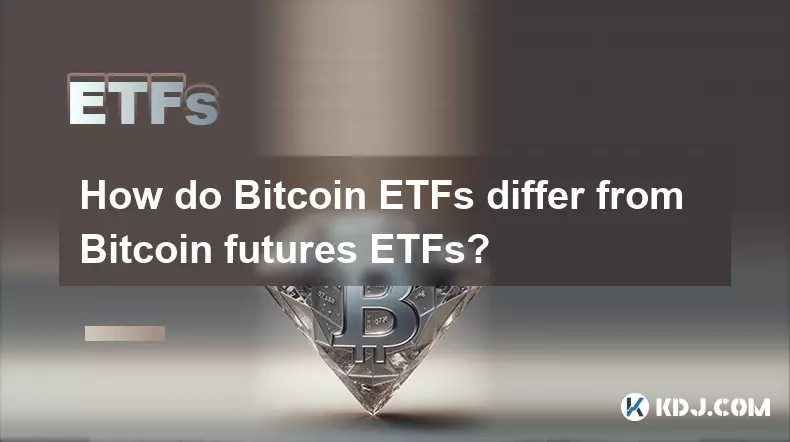
How do Bitcoin ETFs differ from Bitcoin futures ETFs?
Sep 23,2025 at 09:37pm
Differences Between Bitcoin ETFs and Bitcoin Futures ETFs 1. A Bitcoin ETF directly holds actual Bitcoin as its underlying asset, allowing investors e...

Will Bitcoin ETFs affect Bitcoin's decentralized nature?
Sep 24,2025 at 02:00am
Impact of Bitcoin ETFs on Market Accessibility1. Bitcoin ETFs have significantly lowered the barrier to entry for traditional investors who may not be...

Which exchanges list Bitcoin ETFs?
Sep 26,2025 at 03:18am
Major Cryptocurrency Exchanges Offering Bitcoin ETFs1. The landscape of digital asset trading has evolved significantly with the introduction of Bitco...

What role does a Bitcoin ETF play in an investment portfolio?
Sep 27,2025 at 12:36am
Understanding the Function of a Bitcoin ETF in Portfolio Diversification1. A Bitcoin ETF allows traditional investors to gain exposure to cryptocurren...

Is the volatility of Bitcoin ETFs consistent with Bitcoin?
Sep 26,2025 at 01:18am
Bitcoin ETFs and Their Relationship to Bitcoin Price Movements1. Bitcoin ETFs are financial instruments designed to mirror the price of Bitcoin withou...

What factors influence the daily trading volume of Bitcoin ETFs?
Sep 23,2025 at 07:18am
Market Sentiment and Investor Confidence1. The perception of economic stability heavily affects how investors approach Bitcoin ETFs. When macroeconomi...

How do Bitcoin ETFs differ from Bitcoin futures ETFs?
Sep 23,2025 at 09:37pm
Differences Between Bitcoin ETFs and Bitcoin Futures ETFs 1. A Bitcoin ETF directly holds actual Bitcoin as its underlying asset, allowing investors e...
See all articles










































































